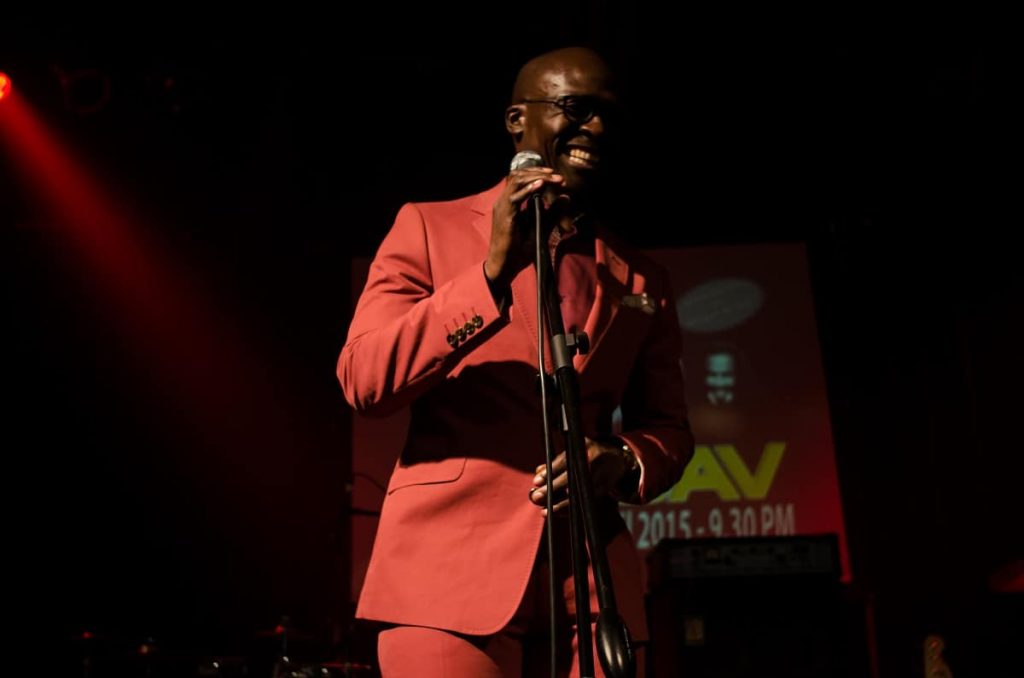Kassav, and Jozi’s love for zouk

Kassav are a band formed in Paris in ’79. They were in Johannesburg recently, where they played to a capacity audience at the Bassline in Newtown. I attended the show without having heard their music prior. Neither was I familiar with how they looked, save for the posters which started going up on lamp posts some two weeks before their show. It was exactly how I preferred it!
The band had just finished their first set when I arrived, and had taken a break. This presented an opportunity to ask a few people their impressions on first set. The people I spoke to stuck to short and punchy, ecstatically-delivered phrases, possibly because they were still trying to digest what they’d just experienced. The feedback was affirmative overall.

It was the weekend following the week of attacks against black people from other African countries. Mainstream media outlets had had a productive week, ceasing every passing moment and using it to broadcast their pornography of violence. The protagonist in this saga: A black man, portrayed this time around as an angry, panga-wielding, war-ready overlord, capable of bringing terror to big cities, mid-size ghettoes and small towns. The minister of Home Affairs, Malusi Gigaba, opened the second half of Kassav’s set with a message assuring Africans from elsewhere on the continent and those based in the diaspora that “South Africa is your home.”
The audience listened intently to the minister, cheering him on with every punchline in his speech. “[The government says] so because [it] knows the role that African played toward the liberation of this country,” continued the minister to more cheers. “And so we say away with xenophobia! Away with Afrophobia! South Africa is your home, enjoy it!”

The first few beats into the second set threw me back to my radio-obsessed childhood in Maseru where our national broadcaster had a show dedicated to the finest Zouk tunes around. It was capably-hosted by Treaty Makoae-Mosese, the late, larger-than-life empress of Lesotho’s entertainment scene. She was cool as a bird’s wings when they flap. She made listening to Radio Lesotho on a Saturday at 12pm while waiting for lunch to get served fun as hell! She was rocking print fabric and schooling an entire nation about different African music scenes before it was stylish to do so.
As flag-bearers of Compas/Kompa and grand innovators of Zouk, Kassav provided a live and direct passageway for me to connect to that time. It wasn’t only visceral, it transcended. The music, it was powerful!
The band have roots in Lesser Antilles regions of Guadeloupe and Martinique, and its members have lived in Senegal, France and elsewhere. Their music is just as unbounded; founding members experimented with genres ranging from rock to disco before settling for Kassav’s Zouk sound and releasing their first album, Love and Kadance. Pictured above is Jacob Desvarieux. He was working as a studio musician when Pierre-Edouard Décimus approached him with the vision for Kassav.

Though founded in Paris, Kassav are very much a Carribean group. Jocelyne Béroard and Jean-Philippe Marthély shared main vocal duties during the night, each playing off of each other’s strengths like friends who’ve spent enough time bouncing ideas around and getting to appreciate each others’ qualities; and are gracious enough to let the other shine at any given moment. Jean-Philippe joined Kassav in 1981 on Kassav n°3; he is known, through his solo work, and the “inventor of Zouk love (links to French website).” Other members in the band have solo projects on the side. Jocelyne, for instance, is regarded as the first Carribean woman to release a gold-certified album. Kassav seems to be the mothership of sorts; a launchpad for alternative worlds and imaginations.
It was open groove season from the moment the band got on stage. No one really stopped dancing, save for a brief moment to take a selfie or three with friends. The message was love, overall; it was enacted through gyrating hips, endless sing-along’s, and clapping of hands, and shouts and screams for more. More. More!






















